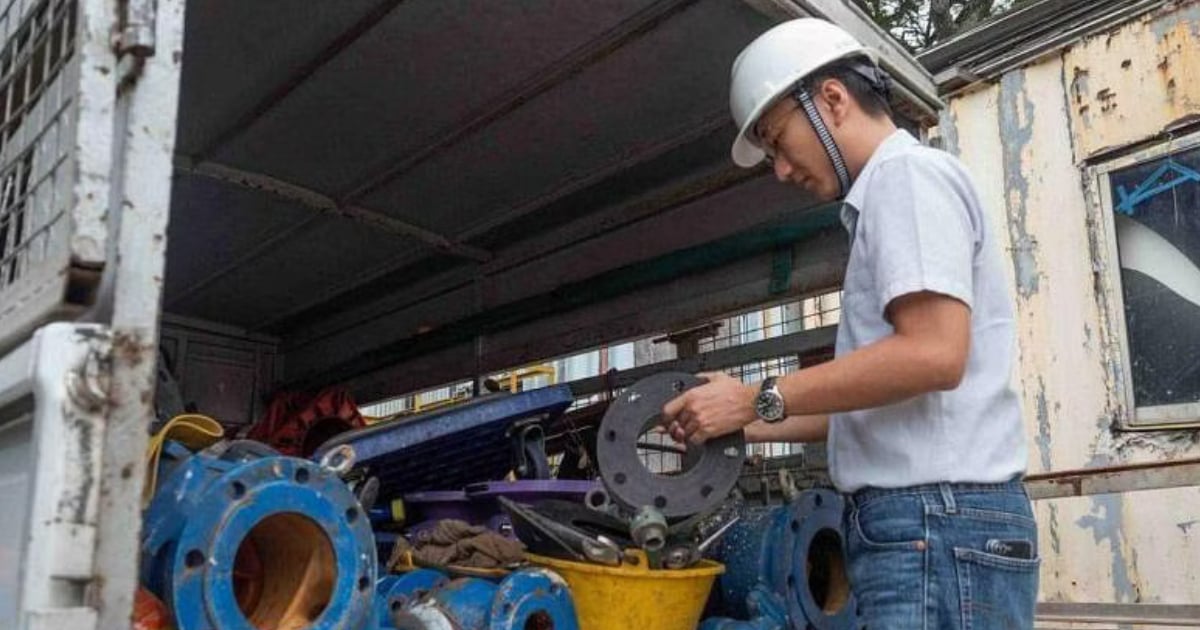If you’re looking for a career change, you might find your next calling after reading this article.
Recently, a local licensed plumber sat down with Shin Min Daily News to talk about his job and its prospects.
Spoiler alert: His job might actually be more glamorous than you think.
Mr Gary Tan, the plumber who shared his experience, told Shin Min that he started studying engineering part-time at a private university after completing his engineering studies at Nanyang Polytechnic.
Eight years ago, he chanced upon an opportunity to join a plumbing company while searching for a job.
He decided to take a leap of faith and join the company.
Since then, he has continued to work for the same company.
After starting as a project engineer, Mr Tan became the company’s project manager three years later.
License Not Compulsory, but Licensed Plumbers Make Over Twice as Much as Unlicensed Plumbers
And you might be surprised to know that getting licensed as a plumber is not a requirement for the job, but it definitely has its perks.
Mr Tan, who is also the youngest member of the Singapore Plumbing Society, recalled how he started studying for a licence two years after entering the industry.
With the support of his company, he was able to get his license.
According to him, plumbers who work on various projects like renovation work and construction projects for individual units are not required to hold a license.
Hence, over 90% of plumbers hired by employers are actually not licensed.
However, being licensed has its perks.
Apart from having better career prospects, Mr Tan revealed that licensed plumbers earn more than twice as much as their counterparts without a license.
In particular, licensed plumbers usually make anywhere around $6,000 to $8,000.
And if that’s still not enough for you to give up your air-conditioned office job, here’s another catch: Mr Tan once heard of someone who takes home $12,000 every month as a licensed plumber.
Additionally, licensed plumbers have to do less ‘dirty work’ as they mostly carry out observational or demonstration works instead.
However, plumbers looking to get licensed need to undergo six to nine months of training under three different organisations.
As for the cost of obtaining a license, Singaporean citizens need to spend around $1,000 after subsidies, but foreigners will need to spend around $4,000.
Hence, having plumbers get licensed is a large expense for companies that hire these plumbers.
Mr Tan also estimated that around half of foreign plumbers working in Singapore are not licensed.
First Derived Satisfaction From Job During Start of COVID-19
When speaking about the highlights of his job, Mr Tan said that the first time he felt satisfaction and a sense of meaningfulness from his job was during the start of COVID-19, when plumbers were deemed essential workers.
During the Circuit Breaker, many renovation companies with unlicensed plumbers were deemed as ‘unessential’, meaning that they were unable to operate during that period of time.
As a result, jobs such as plumbing repairs and tank cleaning in shopping centres and buildings could only be conducted by licensed plumbers.
Mr Tan recalled how business was booming for his company; business more than tripled for them during the Circuit Breaker in 2020.
As a result, Mr Tan and his colleagues worked longer hours during that time.
During his busiest day, Mr Tan had to travel to five or six buildings and worked for over 12 hours.
Additionally, younger plumbers like Mr Tan took up the responsibility of maintaining water pipes in various buildings.
This was because the severe COVID-19 situation in foreign worker dormitories at that time meant that only 20% of foreign workers were able to leave their dormitories for work.
Older plumbers were also at a higher risk for contracting COVID-19, further prompting the younger plumbers to take on more responsibilities.
Lack of Manpower in the Plumbing Industry
However, despite the desirable salary and prospects, Mr Tan revealed that there is still a lack of manpower in the plumbing industry and that it has become a sunset industry.
He added that foreigners are the main group of people working in the industry.
However, with the foreign worker levy, companies have resorted to hiring fewer foreigners as a whole.
Apart from that, the average age of plumbers in Singapore ranges from 50 to 60 years old, meaning the industry faces an ageing issue.
According to Mr Tan, some of his older colleagues in their 70s are still working as plumbers.
However, many younger people are unwilling to join the industry due to concerns over the working environment and salary.
Measures to Increase the Number of Younger Plumbers in the Industry
Despite the lack of younger plumbers in Singapore, authorities have collaborated with the Singapore Plumbing Society to try and attract more youngsters to join the industry.
Since then, Mr Tan has observed an increase in young people joining the industry; the percentage of young plumbers attending the society’s training courses has increased from 10% last year to around 30% this year.
Apart from that, the Public Utilities Board (PUB) and the Singapore Plumbing Society also launched a digital platform last Friday (2 June) to gather licensed plumbers, interior designers, facility managers and other industry professionals.
The platform serves as a method of increasing partnerships between these individuals.
Mr Dickrose Masalamani, the President of the Singapore Plumbing Society, also told Shin Min in an earlier interview that over ten business owners and more than 50 licensed plumbers have signed up for an account on the platform since it was launched.
He also expressed his wish for more people to join the platform so business owners can easily search for professionals that meet specific job requirements.
On the other hand, professionals can increase their chances of being hired for specific projects.
